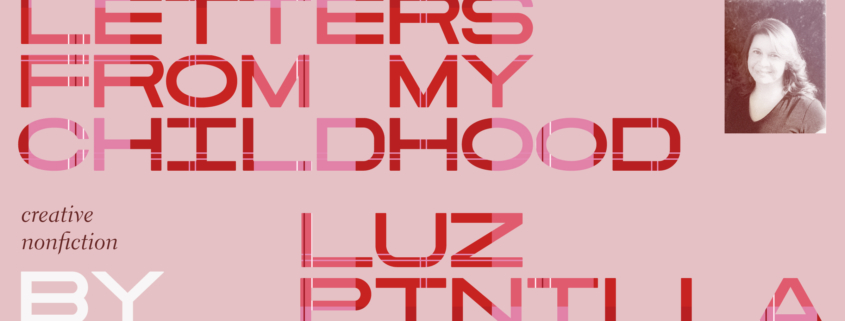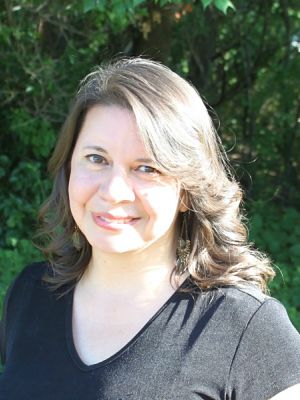Letters from My Childhood
The cover of my phonics workbook is plaid like my uniform but in reds and pinks and whites. Inside, each page is covered with little pictures. Crowns, shoes, fruits, stars, each in its own little box.
Then there are the letters. I know them all and know the sounds they make, but in English they are different. E is A and I is E, and two Os together sound like U. H has lots of friends and sounds like J when it’s alone.
It’s a lot to remember. My tongue flips and turns and bends when I try to form the sounds my teacher makes, but in my head, the letters speak to me in Spanish. Milk is “meelk.” Toad is “tow-odd.” Mouse is “moseh.”
When I get my papers back, they’re covered with Mrs. Castle’s marks. Red slashes over the pretty pictures. I have learned that 100 is the goal for everything, but those phonics workbook pages come to me with ugly numbers at the top, 80s and 70s, sometimes lower. At first, I close my eyes and try harder to hear the words I’m reading, try to listen for the sounds, but the slashes keep coming like little scratches on my skin, and eventually I give up.
Eventually, the English sounds begin to make more sense. I make room for them inside my Spanish-speaking head, and one day I discover that I can read the books my teacher reads all by myself. Then it’s like a dam has broken and I am gushing through, free to read anything I want.
I spend more time coloring the pictures, adding details here and there, a ribbon to a girl’s head, leaves to a flower. The directions say to draw a ring around the correct answer. I know they mean a circle, but I start making fancy diamond wedding bands instead. Mrs. Castle calls me over for a private conversation.
“You need to try harder,” she says, pleading. “Focus on the words.”
I admire her thick brown hair as she speaks, the way it curls under at the ends. I don’t want to make her angry. I wish I could be as good at phonics as I am at math.
In math class, we have each cut out and decorated our own paper armadillo. Mrs. Castle has put up giant cacti all around the room. On Fridays, we take a timed test, addition and subtraction problems arranged in neat rows. Every time you pass a test, you are rewarded with a new one the following week, and your armadillo moves ahead. The tests get harder and harder, with more problems, bigger numbers, and tricky moves like zeroes on the top when you’re subtracting. I love them. I hear my father’s voice in my ear telling me all the tricks, and my pencil flies through the sheets. Before too long, my armadillo has made it all the way across the room to the final cactus. My teacher says there are no more tests and I ask if I can start over from the beginning again, just for fun.
But phonics class isn’t like that. Mrs. Castle cocks her head and frowns at me, and it feels as if I’ve let her down. I stop drawing rings and coloring the pictures, but my grades do not improve.
* * *
One day, we’re sitting on the carpet and she’s reading us a book. Her voice flows up and down in rhythm like she’s singing. I don’t know everything she’s saying, but I love to hear her speak. Suddenly she stops and puts the book aside. Her eyes get big with excitement and she tells us about something called poetry, about rhyming words. Then she gives us some examples.
“Do you hear?” she says, and I do. I hear the words; I recognize the sounds. I like this thing called poetry. “Now you try!”
A hand shoots up from the front of the class. Grace McCallister, of course. Grace is the most beautiful child I’ve ever seen. Her hair is long and straight and gold. Not yellow blonde, but actually gold. She wears it pulled up tight and smooth away from her face, gathered in a high ponytail without a single untamed strand. She is perfect in every way a child can be perfect. Always has the right answers, never gets her clothes dirty, and refers to her grandparents as Grammy and Grampy. I have looked up to her since the first day of school.
“Cat and bat,” she says now, beaming.
Mrs. Castle smiles and nods then looks around the room. One by one, she calls on each of my classmates. A few of them answer incorrectly on their first attempt, but after another try, they get it.
Then I hear her call my name.
“Bob and pop,” I say, but Mrs. Castle shakes her head.
“Hat and bad?”
She repeats the words after me, emphasizing their ending sounds. “Hat-tuh, bad-duh.”
When I mention that I don’t want to speak Spanish anymore, my mother grows serious and tells me “No señora.” She has a friend mail her a book of Spanish grammar from Colombia.
“Try again,” she says. “Listen to them in your head.”
I take a breath. Try to form the words in my mouth before saying them out loud. Finally, I think I’ve got it.
“Sit and sat,” I say, smiling this time, ready for her words of praise, but they don’t come. Instead, she says she’ll get back to me, but after calling on my other classmates, she has us all return to our desks to write our spelling words. I pick up my pencil and begin to work, but all I can think about are rhyming words. I don’t understand why the ones I’d said were wrong and all the others right. I start to write some new words on the margins of my page, and suddenly, in the middle of class, it comes to me.
“Duck and truck!” I shout, and the other children jerk their heads up in surprise. They laugh at me, and even Mrs. Castle chuckles.
“You got it!” she says, and I feel my heart grow warm with happiness inside my chest.
For the rest of the day, I go around smiling as I think of other pairs of words that rhyme—sometimes even sets of three. I’ve got it, I tell myself, and it feels as if I’ve won.
* * *
Eventually, the English sounds begin to make more sense. I make room for them inside my Spanish-speaking head, and one day I discover that I can read the books my teacher reads all by myself. Then it’s like a dam has broken and I am gushing through, free to read anything I want. The school library is across the hall from Mrs. Castle’s room and I look forward to our weekly visits.
At home, my mother says my name the way it’s meant to be pronounced, with a long U and lofty As, the Z a hiss and not a buzz. She takes advantage of my newfound English knowledge by having me read aloud. She tells me I am helping her learn English that way, and that makes me happy too. Our favorite book to read together is Are You My Mother, about a little bird who hatches from its egg only to find itself alone in the nest. We read the book again and again and again, until I have learned all the words and illustrations by heart.
When I mention that I don’t want to speak Spanish anymore, my mother grows serious and tells me “No señora.” She has a friend mail her a book of Spanish grammar from Colombia.
The cover says Coquito and it has a picture of a boy flying a kite over a hilly countryside. Inside there are stories and sentences, writing prompts and riddles, all in Spanish. We sit together at the kitchen table late at night, my mother looking over my shoulder as I practice my compositions in a notebook she has bought just for this purpose. She has me copy the stories along with the drawings. I write the vocabulary words many times, and then she calls them out to test me. She makes me practice my penmanship, too, and teaches me the rules of when to use accent marks. It’s like going to school in Spanish after going to school in English.
* * *
One day, my mother says she has a surprise for me, and she drives me to a one-story building with narrow vertical windows all the way around. The sign in front says Nicholson Memorial Library, and as we enter through the sliding double doors, the smell of paper wraps around me like a tongue and pulls me in.
The children’s section sits inside a corner near the entrance, but it’s hidden from view by the shelves of books I’ll get to when I’m older. In the open space behind them, four large, brightly colored seats shaped liked giant M&M’s are arranged into a square. Between them are dark blue beanbags you can sit on too, and in another area, they have tables with little chairs like the ones at school. My mother helps me find the shelves of children’s books and leaves me rocking on one of the giant M&M’s while she heads over to the grown-up section of the library.
This is how we spend our Saturdays, my mother and I. She has a card that gives us permission to take the books home, and every time we leave, it’s with armfuls of our new friends. I take them everywhere and read them every chance I get. I put some in a bag and carry them up when I climb the tree in our back yard. I take them to the outer yard and lay down on the grass to read.
And when my father does the thing where he checks for a rash between my legs, I take a book and prop it up against my chest. I hold it in a way that makes it turn into a wall, with me safely on this side, reading the words and looking at the pictures, while other things take place behind it.


 Luz Pinilla is a Colombian-American writer of literary fiction, creative nonfiction, and poetry. She is a student in the creative writing program at the University of Texas at El Paso and holds a master of arts in aesthetic studies from the University of Texas at Dallas. Her work has appeared in The Acentos Review, 34th Parallel Magazine, and Straight Forward Poetry. Please visit
Luz Pinilla is a Colombian-American writer of literary fiction, creative nonfiction, and poetry. She is a student in the creative writing program at the University of Texas at El Paso and holds a master of arts in aesthetic studies from the University of Texas at Dallas. Her work has appeared in The Acentos Review, 34th Parallel Magazine, and Straight Forward Poetry. Please visit 


